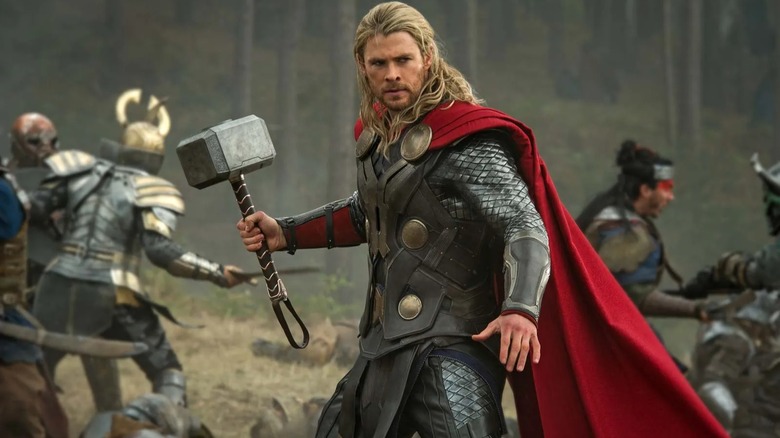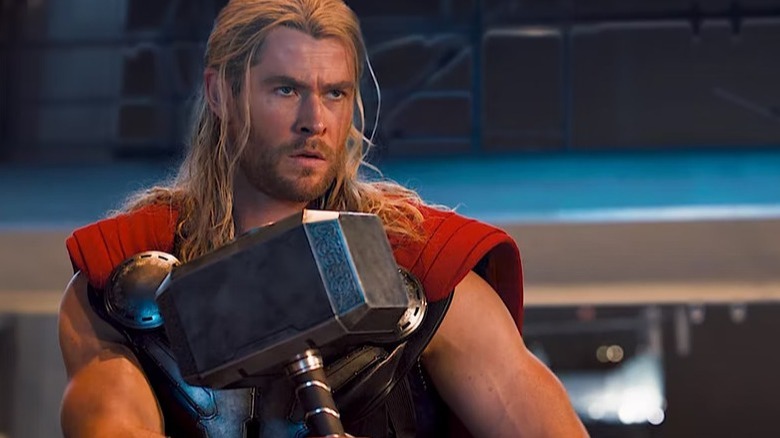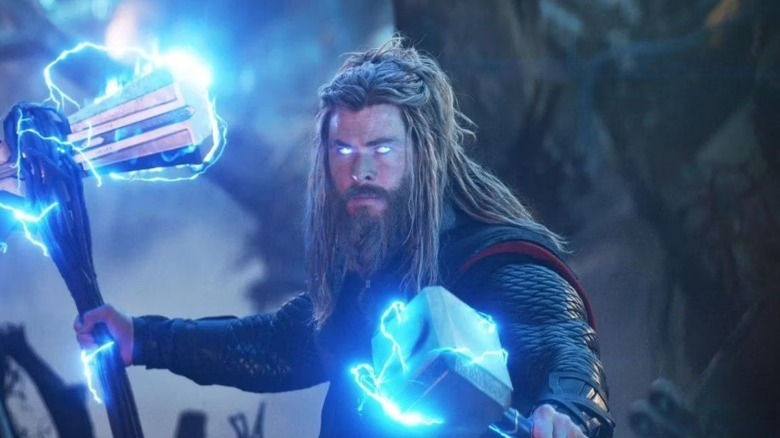How Thor Became Marvel's Greatest Hero
Thor was first introduced in Marvel Comics' "Journey into Mystery #83" as one of the "most exciting superheroes of all time"; the story follows a man named Donald Blake who is transformed into the God of Thunder after Stone-Men from Saturn invade Earth. Since then, Thor's trajectory in the comics has been an interesting one, as the figure inspired by Norse mythology eventually ends up as a part of the Avengers, and is now considered one of the mightiest heroes in the Marvel Cinematic Universe.
In Kenneth Branagh's "Thor," the titular figure (played by Chris Hemsworth) embarks on the Hero's journey after his father Odin (Anthony Hopkins) exiles him. Thor has experienced considerable trauma and personal loss throughout the course of his appearances in live-action, and the Mjolnir-wielding hero has experienced more personal growth than most superheroes in the MCU.
Now, Thor is back for another adventure in Taika Waititi's highly anticipated "Thor: Love and Thunder," which marks the return of Jane Foster (Natalie Portman), who is now the Mighty Thor, and the introduction of a new villain, Gorr the God Butcher (Christian Bale). Here's a look into Thor's trajectory as a superhero, and how he came to be Marvel's greatest hero.
The enduring appeal of a hammer-wielding hero
First off, Thor as a superhero is a joy to watch; the character finds humor in the bleakest of scenarios and is naturally charming to witness. For instance, in "Thor," he goes from a celebrated god in Asgard, next in line for the throne, to an exiled nobody on Earth, who is forced to start from scratch and step into his true power. Prior to his exile, we see him engaging in banter with his half-brother Loki (Tod Hiddleston), and while their dynamic is a rather complicated one, the exchange is mostly light-hearted and humorous — at least until things eventually go awry.
Comic book editor and writer Nate Cosby talked about how Thor is a likable character who is "fun to watch," especially when he is wielding the Mjolnir and beating up the baddies — be it on his own or with his superhero team, depending on the nature of the threat. Cosby goes on to liken Thor to "Superman with a hammer," and that his "strong, striking presence" presents his as a godlike, yet relatable superhero worth rooting for. Then there's the humor, amplified greatly in Waititi's "Thor: Ragnarok," which is evident throughout the scenes set on the garbage planet of Sakaar.
Apart from this, Thor is obviously valiant and endlessly brave — a quality that manifests in various ways through the "Avengers" and "Thor" movies. For instance, in "Infinity War," Thor goes to great lengths to forge the Stormbreaker, an epic Asgardian weapon that could potentially kill Thanos (Josh Brolin). Despite being warned about the dangers of realigning Nidavellir's rings, Thor repurposes the power of a neutron star and almost dies in the process of crafting the weapon. That's courage worth rooting for, right there.
Healing unimaginable trauma and emerging stronger
Life can be difficult as a superhero, surely. The horrors of existence, combined with the burden of being a powerful being, can lead to catastrophic personal losses and failures. For instance, after Wanda loses Pietro and Vision (Paul Bettany), this loss urges her to create a hex reality to cope with her pain in "WandaVision." Wanda's actions in "Multiverse of Madness" are obviously driven by pain and a need to be in control; the Darkhold further corrupts her mind, and she loses herself in the process.
Thor deals with loss and pain in a markedly different way, and to be fair, he has endured a lot. Being a god does not exempt you from heartbreak or the loss of a loved one. Thor has watched his family and friends die and his home realm destroyed, and the events of "Infinity War" push him over the edge. While Thor's appearance in "Endgame" is mostly supposed to function as a joke, his depressive, indulgent state is simply his way of coping with trauma, his humor a mask to conceal his building cynicism.
However, Thor grapples with his emotions and reaches a point of healing — yes, he has had moments of failure, but would he allow it to stop him from stepping into his power? Thor learns that he is worthy in spite of his failures, which eventually helps him find his footing in the final war with Thanos and head towards the person he is in "Thor: Love and Thunder." Although fresh horrors await him in the new film, and the return of Jane complicates things for him emotionally, Thor remains a genuinely humorous, resilient force, making him one of the greatest heroes to ever live.
"Thor: Love and Thunder" hits theaters on July 8, 2022.


